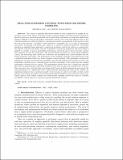Real-time ensemble control with reduced-order modeling
Author(s)
Lin, Binghuai; McLaughlin, Dennis
DownloadLin_McLaughlin_Real-time_ensemble.pdf (7.625Mb)
Other Contributors
Massachusetts Institute of Technology. Earth Resources Laboratory
Metadata
Show full item recordAbstract
The control of spatially distributed systems is often complicated by significant uncertainty about system inputs, both time-varying exogenous inputs and time-invariant parameters. Spatial variations of uncertain parameters can be particularly problematic in geoscience applications, making it difficult to forecast the impact of proposed controls. One of the most effective ways to deal with uncertainties in control problems is to incorporate periodic measurements of the system’s states into the control process. Stochastic control provides a convenient way to do this, by integrating uncertainty, monitoring, forecasting, and control in a consistent analytical framework. This paper describes an ensemble-based approach to closed-loop stochastic control that relies on a computationally efficient reduced-order model. The use of ensembles of uncertain parameters and states makes it possible to consider a range of probabilistic performance objectives and to derive real-time controls that explicitly account for uncertainty. The process divides naturally into measurement updating, control, and forecasting steps carried out recursively and initialized with a prior ensemble that describes parameter uncertainty. The performance of the ensemble controller is investigated here with a numerical experiment based on a solute transport control problem. This experiment evaluates the performance of open and closed-loop controllers with full and reduced-order models as well as the performance obtained with a controller based on perfect knowledge of the system and the nominal performance obtained with no control. The experimental results show that a closed-loop controller that relies on measurements consistently performs better than an open loop controller that does not. They also show that a reduced-order forecasting model based on offline simulations gives nearly the same performance as a significantly more computationally demanding full order model. Finally, the experiment indicates that a moderate penalty on the variance of control cost yields a robust control strategy that reduces uncertainty about system performance with little or no increase in average cost. Taken together, these results confirm that reduced-order ensemble closed-loop control is a flexible and efficient control option for uncertain spatially distributed systems.
Date issued
2013Publisher
Massachusetts Institute of Technology. Earth Resources Laboratory
Series/Report no.
Earth Resources Laboratory Industry Consortia Annual Report;2013-06
Keywords
Modeling